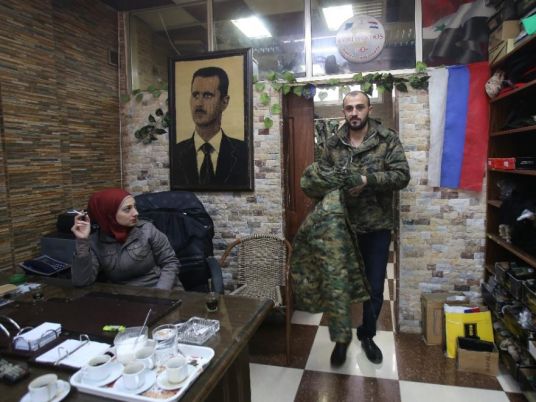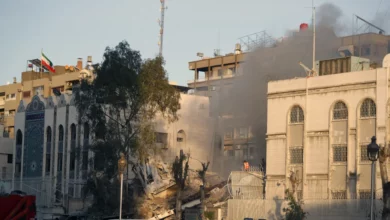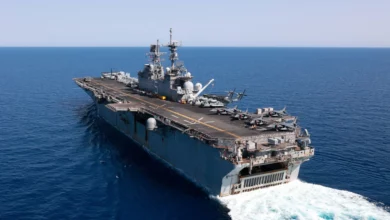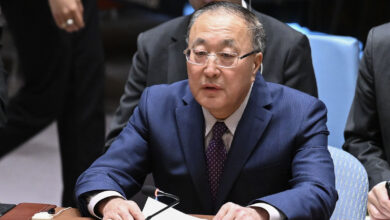
In the windows of his father's shop in coastal Syria, Ihab replaces bottles of the national tipple arak with vodka, hoping to please his growing customer base of Russian soldiers.
"In the past the demand was more for whisky and arak, but with the Russians arriving in Syria, it's changed to vodka," Ihab, 32, says inside the "Crown" store in Latakia province.
"So I put these bottles in the front so they can grab them first," he says with a smile.
Ihab's storefront is one of many shops and restaurants hoping to attract the Russian soldiers who have arrived in Latakia since Moscow began a military intervention in Syria in late September.
Russia has stood firmly by its longtime ally President Bashar al-Assad since an uprising against his regime began in March 2011, providing political and military support to a government that has become an international pariah.
On September 30, Moscow began air strikes in support of the government, dispatching warplanes and several thousand servicemen to Syria, according to Russian officials.
The planes and soldiers are based at the Hmeimim military airport deep in Assad's heartland, south of the provincial capital of Latakia.
Russian soldiers go into the city for food, drink and entertainment, creating a new customer base with different demands for Latakia's businesses.
To make what he calls his "new friends" feel comfortable, Ihab has begun learning a few Russian words from his father.
'Sales are up'
"The Russians are a profitable economic presence, and our sales have gone up more than 20 percent since they don't argue about prices," Ihab says.
Russia's ties with Syria go back decades, with Moscow long maintaining a naval facility in the coastal town of Tartus.
Many Syrian military officers have trained in Russia, and it is not uncommon to find Syrians married to Russians or who speak the language.
Elsewhere in Latakia, Mohammad is arranging a display of camouflage jackets in "Commandos", a shop that sells military-style clothing and accessories.
The 26-year-old employee says sales are up and he now has more Russian customers than Syrians.
Pocket-sized portraits of Assad — stacked next to boxes of combat boots under a large Russian flag on the wall — are in particularly "high demand by Russian soldiers", he says.
Mohammad is also learning some Russian words and is pleased to see Russian soldiers learning Arabic words such as "salam", which means "peace" and is used for both hello and goodbye.
"They've become our friends," he says. "They pass by to say hello or they wave at me from afar as they pass by the place."
Haidar, 29, is so enthusiastic about the Russian presence that he has named the restaurant he opened last month "Russia".
"I've loved Russia and Russians since my childhood, and now is the time to express my love for them through my restaurant," he says.
The Russian flag billows in the breeze outside and the walls inside are covered with Russian sayings.
"Spasiba, spasiba," he calls out to his customers with a wide smile as they leave the restaurant. "Thank you, thank you."
On the house
Haidar has hired a Russian language professor to teach his staff how to communicate with their new guests and hopes to find a chef who can make dishes for an all-Russian menu to please his new customers.
"The Russians have revived both the nightlife and daytime businesses," Haidar says.
But a Syrian soldier sitting nearby says the fuss over the Russians is "exaggerated".
"The whole world is focusing on the Russian army and has forgotten all about the Syrian army," he says. "We have been fighting for nearly five years and I haven't seen a single place called 'Syria' or 'The Syrian Army'."
And not everyone in Latakia's business community sees the Russians as paying customers.
Tarek Shaabo, 30, says he opened his coffee shop — Moscow Cafe — in 2012 as a sign of gratitude to Russia for vetoing UN Security Council resolutions on Syria's war.
"Since then, I swore to myself I would never let a Russian customer pay," he says.
When he first opened, only a few Russian military advisers would come to the shop, but now he says he serves Russians "nearly every day".
Another coffee shop nearby offers Russians drinks at half price, but at Moscow Cafe they are free.
"They came to defend us," Shaabo says. "The least I can do is host them in my small cafe."
He lights a cigarette using a lighter emblazoned with the Russian army's logo and extends an invitation to President Vladimir Putin, fondly nicknamed by some Syrians as "Abu Ali".
"Tell Abu Ali Putin he's got a place to stay in Latakia… Moscow Cafe is his home."




